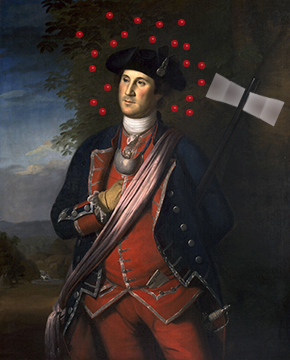 There was a story I heard years ago when I was in
elementary school. We had a history lesson on George Washington, the father of
our country. The story had to do with young George receiving a hatchet from his
father and trying his hand at using it to cut down a cherry tree. His father
was not happy about the felled tree and confronted his son, to which George
purportedly said, "I cannot tell a lie…” and confessed to his wrongdoing.
There was a story I heard years ago when I was in
elementary school. We had a history lesson on George Washington, the father of
our country. The story had to do with young George receiving a hatchet from his
father and trying his hand at using it to cut down a cherry tree. His father
was not happy about the felled tree and confronted his son, to which George
purportedly said, "I cannot tell a lie…” and confessed to his wrongdoing.
That story first appeared in a biography about Washington
in 1806 entitled "The Life of George Washington” by Mason Locke Weems. It
was a book that played up the virtues of the first president and sought to
paint him in a very favorable light in the decade after his death. That same
story was picked up and revised by a man named William McGuffey in 1836. He
published a series of children’s short stories called "McGuffey’s Readers.”
These books were used in schools for almost a century to help children learn to
read. But other sources were perpetuating the cherry tree story. None other
than P.T. Barnum, the famed circus showman helped to promote the idea when he
claimed that a slave that he purchased in 1835 by the name of Joice Heth, was
the 161-year-old nurse of George Washington. He put on a show with Heth,
telling the story of the cherry tree.
People believed the cherry tree story was true. It was
told and retold so many times and was written about in books and taught in
schools. However, there is no proof that it ever happened. It was a complete
fabrication. Washington never told anyone about it. It was not a story told by
any of his family or friends from the era. Why did people believe it? The
simple answer is marketing. People believe what they hear in marketing until it
is proven untrue. Even then, some stories are so entrenched that we have a hard
time admitting that they didn’t happen.
You may be thinking that we live in a much more informed
and sophisticated time. People don’t fall for myths like the cherry tree story
anymore. Before you go there, you may want to get a firm grip on your National Enquirer or take a glance at
the latest ad trending across your web browser. According to Snopes, some of
the biggest hoaxes that people fell for in the past year included stories that
claimed the fast-food restaurant, Wendy’s, was closing all locations, that Disneyworld
was moving from Orlando to Atlanta, that Facebook was going to start charging
for each account. All these were just clickbait to get people to take a look at
a sensationalized lie.
Marketers have had a tendency to exaggerate the truth.
From a marketing perspective, people tend to believe what we tell them, that is
until we are proven to be lying. That’s when the real trouble can start. We are
charged with promoting a brand and putting it in the best possible light so
people will buy it. However, there is trouble brewing when you cross over the
line and the product or service cannot live up to its billing. So how far can
you push your marketing? The best thing your marketing can do is to find
differences between your product and your competition’s products and sell the
differences that matter to your customers. In other words, find the features,
advantages and benefits that play better than your competitors and promote
them. There is no need to exaggerate how good they are, but it is important to
play up the truth of what makes your brand stand out. That way you don’t have
to make up a story about your brand that will eventually be debunked.
I have to admit, I really wish the George Washington
cherry tree story were true. The story that was used to teach children to be
honest was actually a lie. I want to believe it, but I know it never happened.
Do I feel a bit cheated out of a piece of my elementary school education? I
wouldn’t go that far, however, it has taught me to verify the truth before
believing the things I hear. Keep in mind that people will eventually verify
your marketing claims as well. Better to be telling the truth.
______________
Cherry
Tree Myth, George Washington’s Mount Vernon,
https://www.mountvernon.org/library/digitalhistory/digital-encyclopedia/article/cherry-tree-myth
From
Hoaxes to Mind-Benders: Snopes' Top 10 Stories from 2023, by
Izz Scott LaMagdeleine, Snopes.com